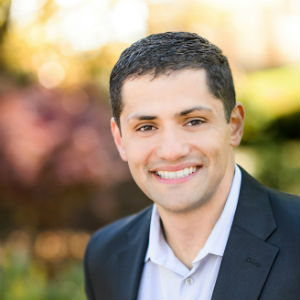
Rasoul, who resigned from his leadership post as secretary of the House Democratic Caucus after the November election, is making a case in similar meetings with citizens around the state. His revolutionary idea for political innovation is simple: It’s time for a change in the way politics is conducted. Let’s build trust on the left and the right, across political divides.
For Rasoul, a Palestinian-American who is the only Muslim member of Virginia’s General Assembly, this outlier stance could be considered even more provocative.
The self-described “brown boy” is upfront about the challenges he faced in his maiden campaign. During the January 2014 special election, though slandered by a mass mailer in which he was accused of taking money from Al Qaeda, Rasoul went on to a resounding win —with 70 percent of the vote— against a Republican, African-American female opponent in the 11th District.
Key to his continued political success, Rasoul says, is his cultivation and retention of constituents who trust him, including an increasing number of Republican donors.
His message of good listening, empathetic understanding and straight-forward dialogue is as applicable to non-profit organizations and businesses as it is to political groups, he argued. All citizens, not just politicians, can build stronger communities and government by “aligning our values with our behaviors, by essentially living those values,” Rasoul said.
Rasoul, who has an MBA and owns a consulting business focused on organizational change and digital marketing, substantiated his argument with examples from the business world. The American culture, driven by “the transparency and accountability that Millenials are pushing for in the digital age,” is calling for these changes, he added. Consumers making informed decisions have led to the establishment of a new business model: B corporations, which integrate social and environmental accountability into their for-profit models. It’s also led to businesses who are more profitable when they are more responsive to consumer demands.
The workshop was hosted by EMU’s Center for Justice and Peacebuilding, which offers a graduate program and training in conflict transformation. Rasoul blends neuroscience with practical skill-building about organizational development.
Docherty pointed out that neuroscience research provides the grounding for CJP coursework and the Strategies for Trauma Awareness and Resilience program (STAR).“His leadership for the common good, bridge-building across so many divides, emphasis on listening and empathy, and integration of neuroscience resonate with CJP core values,” said Jayne Docherty, academic programs director. “His approach to bringing citizens together for positive engagement in a time of deep polarization has the potential to be transformational.”
Post-election divisiveness concerns CJP faculty and staff, who have been working on ways to reach into the local community and to address the broader issue in the nation, she said.
Kai Degner, a former Harrisonburg councilman and mayor who recently ran for the U.S. House of Representatives on the slogan “Listening For A Change,” is one area resident with the same goal.
“Sam’s message to Democrats is they can build more trustworthiness by consistently aligning actions with values, even when that integrity has short-term costs,” Degner says. “I believe we can do a better job of making people feel heard, and that starts with listening. What is freedom of speech worth if no one is listening?”
The former Harrisonburg mayor and councilman, who is a trained mediator, has started a consulting and training program focused on helping people listen better. Degner organized Rasoul’s visit with assistance from Docherty.
Speaking about Degner’s new work, Docherty said, “Listening is the silent side of communication and receives less attention than it should even in our conflict transformation work.”
The audience included citizens from a variety of area action groups.
Story










